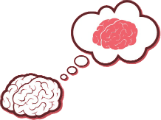 Teach students how their brains are wired for growth.
Teach students how their brains are wired for growth.
READ: The beliefs that students adopt about learning and their own brains will affect their performance. Research shows that when students develop a growth mindset vs. a fixed mindset, they are more likely to engage in reflective thinking about how they learn and grow. Teaching kids about the science of metacognition can be an empowering tool, helping students to understand how they can literally grow their own brains.
REFLECT:
What things might you do in your classroom to help your students understand how to "grow their own brains?"
How might this benefit you as a teacher?
How might this help you to innovate formative assessment?







